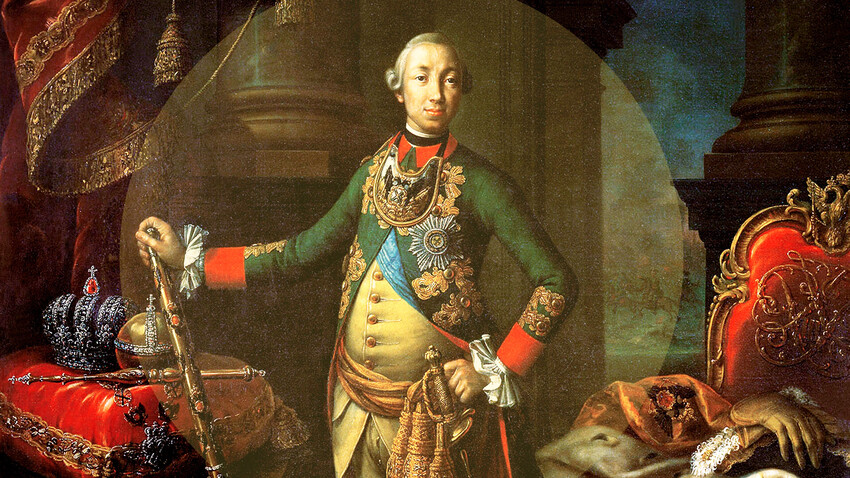
Portrait of Peter III, 1762. / Alexei Petrovich Antropov / Universal History Archive
Getty ImagesKarl Peter Ulrich von Schleswig-Holstein-Gottorf was not yet 15 and he was already feared by Russian Empress Anna Ioannovna. “The imp still lives in Holstein,” Anna repeated often. Young Karl-Peter was the grandson of Peter the Great – and Anna, daughter of Peter’s half-brother (and co-ruler, until 1696) Ivan Alexeevich, certainly wanted her branch of the family to remain on the Russian throne and, therefore, absentmindedly feared and hated Karl-Peter. On the contrary, her cousin Elizabeth Petrovna, who became Empress of Russia in 1741, tried to surround her own nephew with care and attention. In December 1741, Russian major Nikolai Korf arrived in Kiel, where Karl-Peter was living, to take the young man to Russia.
Elizabeth Petrovna had no children and, after her death, the grandson of Peter the Great was to become the Russian emperor. On his arrival in St. Petersburg, however, the young prince made, at the very least, a strange impression on everyone.
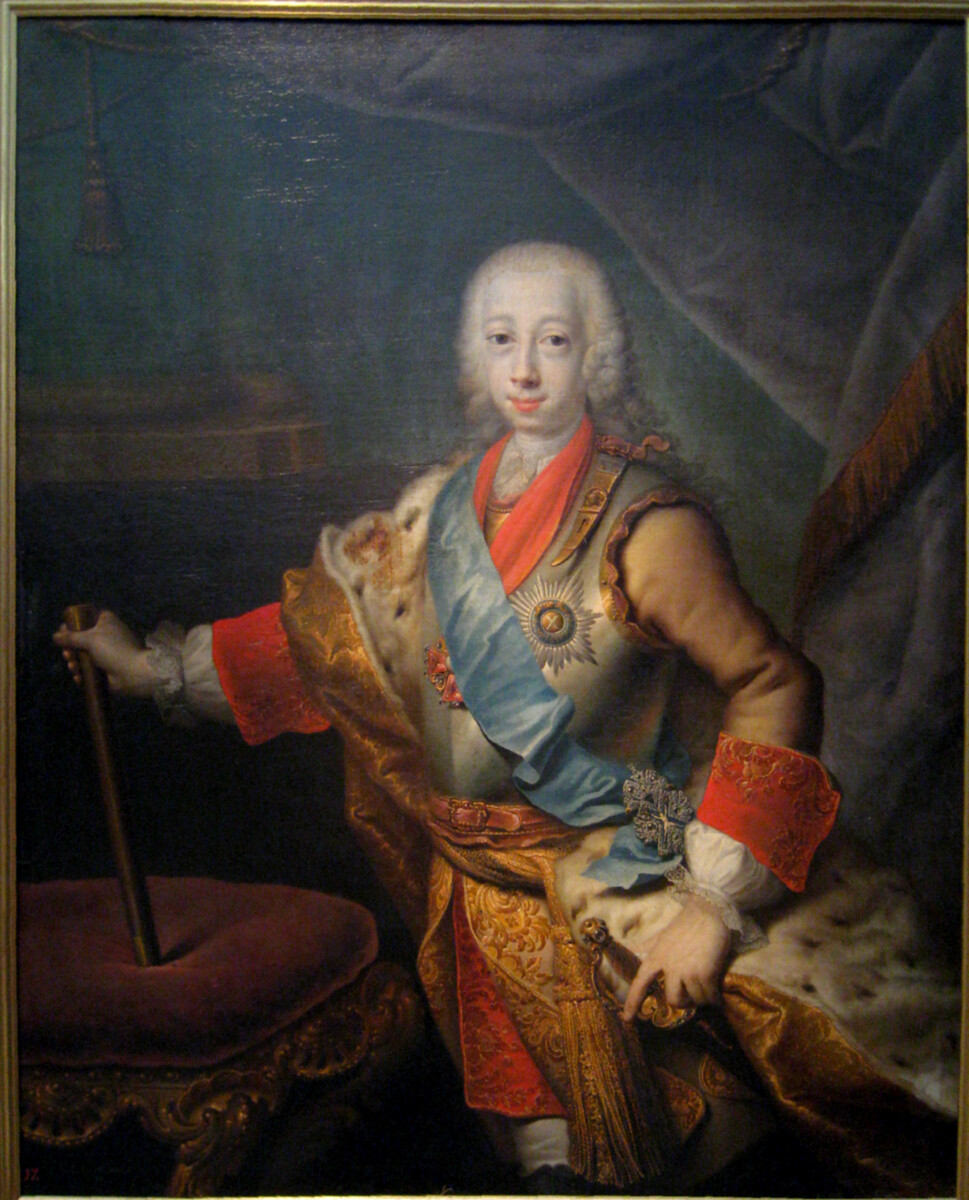
Grand Prince Peter Fyodorovich in 1743, by Georg Christoph Grooth
Public DomainPrince Karl-Peter of Holstein was baptized into Orthodoxy under the name of Peter Fyodorovich in November 1742, just a year after he came to Russia. “He is pale and apparently of weak constitution,” wrote Jakob Stelin, the boy’s tutor, who had been assigned to him in St. Petersburg. When the prince began to be taught the sciences, the Empress was shocked by the ignorance of the 14-year-old boy, who was interested only in military affairs (and a little bit in theology). He had a most morbid predilection for parades, reviews and marches, literally dropping everything he did to stare at the soldiers. But, there were other oddities, as well. It was as if the Prince was not growing older with age.
“He was then sixteen years old, quite handsome before smallpox, but very small and quite a child. He talked to me about toys,” Catherine II, Peter’s wife, later wrote in her memoirs. She also recollected that almost on first meeting, her fiancé admitted to her that he was in love with one of the ladies-in-waiting, but he resigned himself to marry Catherine, because his aunt (Empress Elizabeth Petrovna) wanted him to. In 1745, they married, but Peter did not show much attention to his wife: “The Grand Prince sometimes came into my chambers in the evening, but he had no desire to come; he preferred to play dolls in his room; meanwhile, he was then 17 years old, I was 16,” complained Catherine.
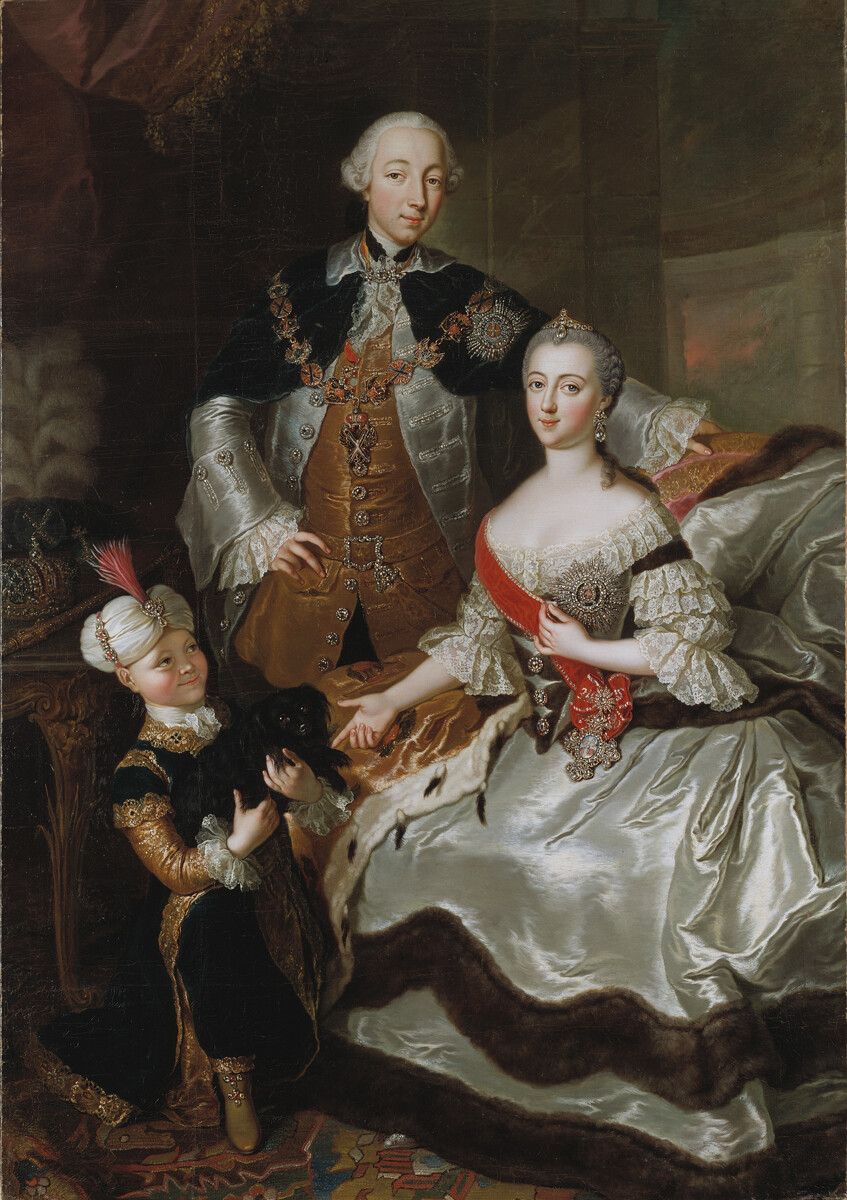
Grand Prince Peter Fyodorovich and his wife, Grand Princess Catherine Alexeevna, 1756
Public DomainTo distract her nephew from toys and military exercises, in 1747, Elizabeth Petrovna assigned to him her sister and her husband, Nikolai Choglokov, a friendly married couple who were to “teach” the prince about family life. But, Peter Fyodorovich had instigated a room maid named Kruse, who, according to Catherine, “delivered to the Grand Prince toys, dolls and other children’s amusements, which he loved to the point of passion: during the day, they were hidden in my bed and under it. The Grand Prince would go to bed first after supper and, as soon as we were in bed, Kruse would lock the door and then the Grand Prince would play until one or two o’clock in the morning.” Then, Peter got himself dogs. Empress Elizabeth was horrified and demanded that they be driven from the palace. The heir disobeyed and hid the dogs in a closet near his wife’s bedroom: “Through the boarded alcove partition,” Catherine later recalled, “there was a smell of dogs and we both slept in this stench.”
Once, Catherine saw a rat hanging in her husband’s room. Grand Prince Peter Fyodorovich explained that the rat was executed for a felony – it sneaked into his paper fortress and ate two starchy soldiers, but one of his faithful dogs caught it and the military court (represented by the Grand Prince himself) sentenced the rat to execution by hanging. Peter was 25 years old at the time.
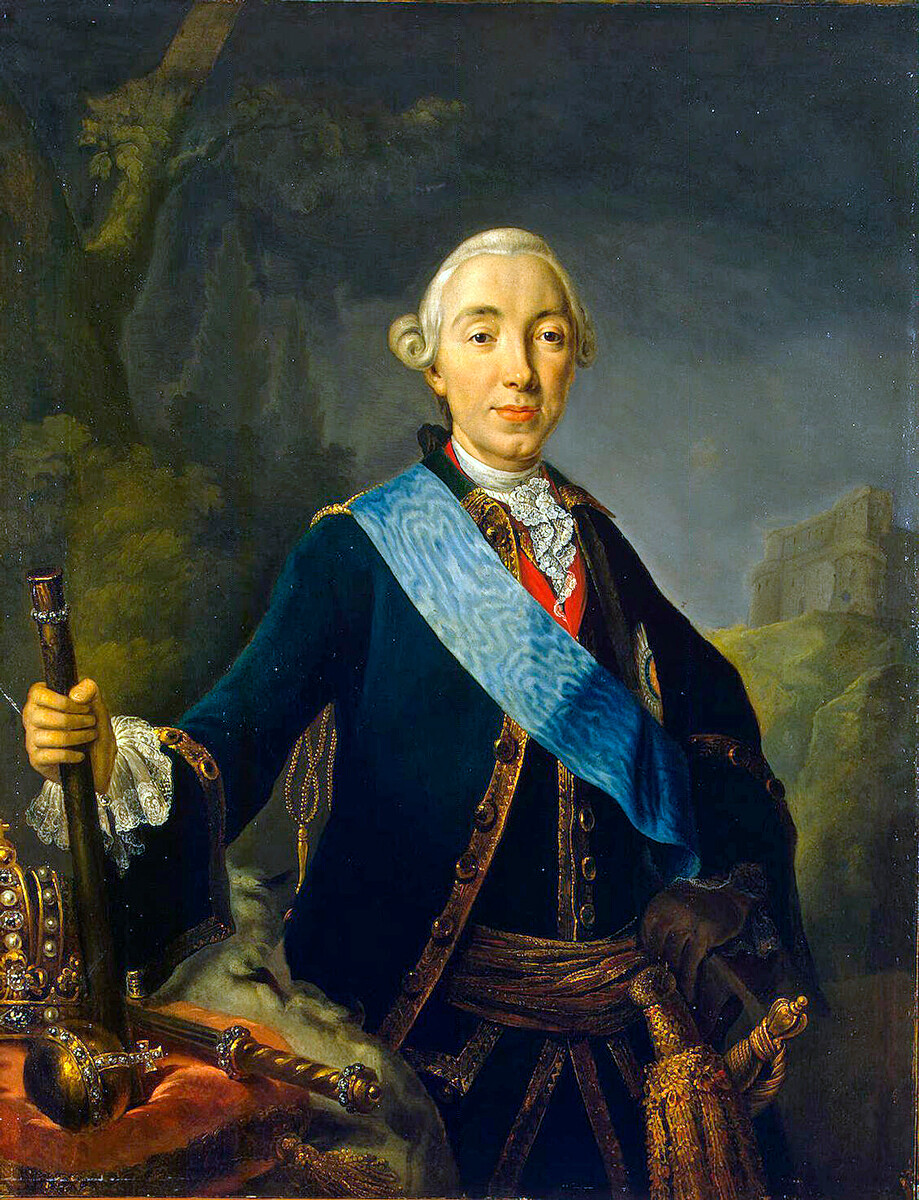
Peter III, official portrait, 1761, by Lucas Conrad Pfandzelt
Public DomainThe future Emperor Peter III had the misfortune of being born a descendant of two sworn enemies – on his mother’s side, he was the grandson of Peter the Great and, on his father’s side – the grandnephew of the Swedish King Charles XII and, thus, had rights to both Russian and Swedish thrones. As a child, the boy’s father nurtured hopes that his son would eventually become king of Sweden and raised him to be a military man. “The Prince himself was appointed a non-commissioned officer, was trained in rifle and marching, went on duty with other courtly young men and spoke to them only of the outward forms of that military. He was so addicted to it from his youth that he did not want to hear about anything else,” wrote Jacob Shtelin. Like Charles XII in his youth, the Grand Prince was well versed in theology and Latin, did good in mathematics and enjoyed drawing plans of fortresses. But, in 1739, after the death of his father (his mother died shortly after Peter Feodorovich was born), Peter was placed in the hands of his tutors, arrogant military men, who began to torment the child.
The chief “tormentor” was Count Otto von Brummer, the steward of the court at Kiel. As a young man, he had served in the Swedish army and had once served as adjutant to Charles XII himself. But, for some reason, Brummer hated his apprentice. “I’ll have you flogged so that dogs will lick your blood; how glad I would be if you were to die now.” These were some of the words he spoke to the little prince. At least, so said the author of an anonymous note on the education of the Grand Prince, which Nikolai Korf brought from Kiel to Empress Elizabeth. Also from this note, the empress learned that “the child often had to wait for food until two o’clock in the afternoon and, with hunger, willingly ate dry bread and when Brummer came, he began to threaten the Prince with severe punishments after dinner, so that the child sat at the table neither alive nor dead and therefore after dinner was subjected to headaches and vomiting.” Every day, the child was taught until six o’clock in the evening and then, for two hours, he was obliged to dance a square dance (quadrille). “I am sure they want to make me a professor of quadrille and I don’t need to know anything else,” the Grand Prince used to say.
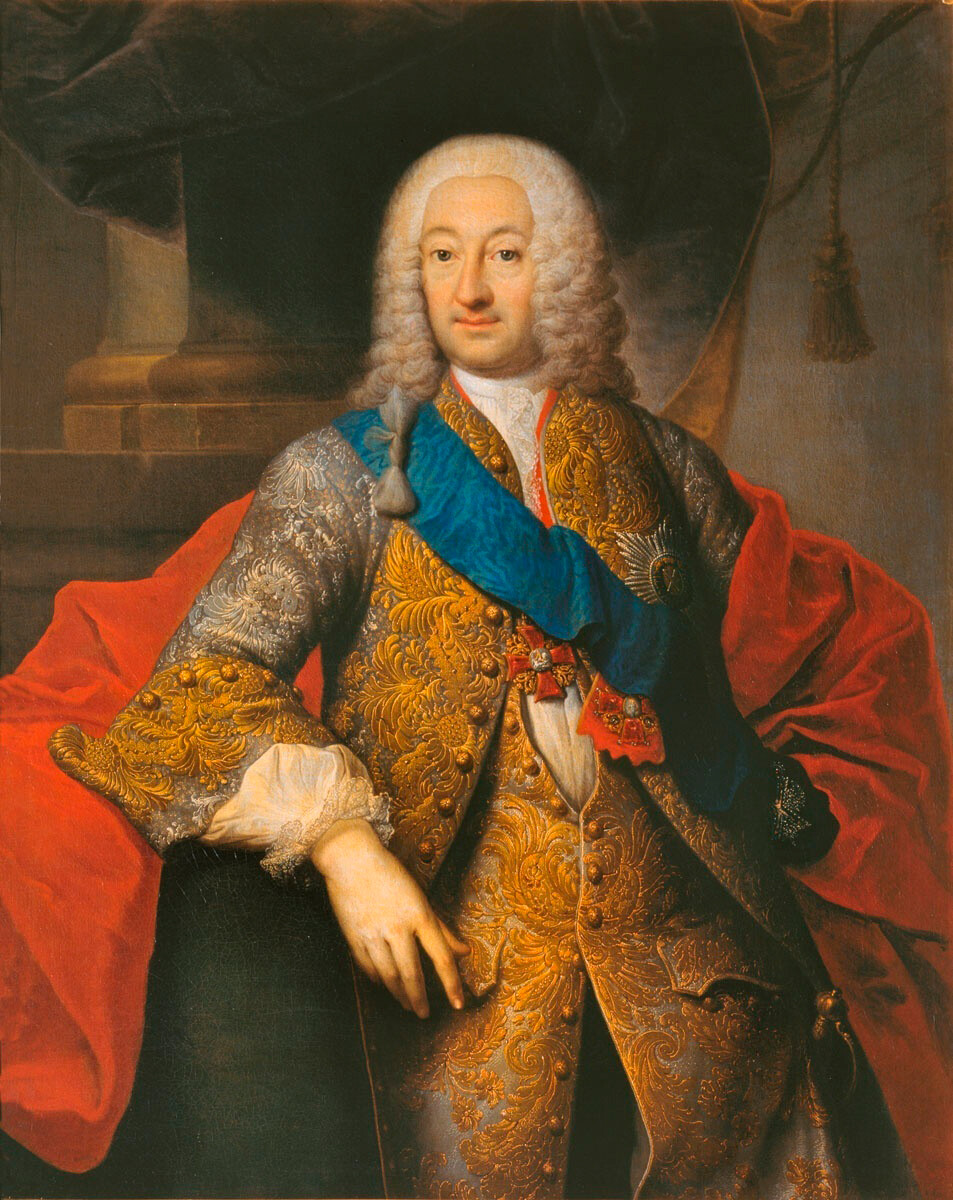
Count Otto von Brummer, by Georg Christoph Grooth
State Museum of Art and Architecture, OranienbaumBrummer especially hated the Russians. As the grandson of Emperor Peter I, the little prince was taught Russian, but, immediately after the death of his father, Brummer stopped these lessons: “This vile language is fit for dogs and slaves only.” Brummer’s punishments were absolutely military. The Grand Prince was made to stand on peas for a long time, until his knees swelled up. He was stripped naked, flogged and whipped in the presence of his servants. He was tied to the foot of the table. He was also starved on purpose. Brummer even used to hang a sign on his chest that said: “Ass”.
Such treatment could not but affect the heir’s character. He grew up stubborn, irascible and anxious. In addition, from his tutors he learned to drink. According to the views of the European military, a dashing soldier had to constantly drink beer or wine. Already in 1745, Catherine wrote: “The Grand Prince was so drunk that he lost all consciousness and could not put two words together.” Afterwards, things only got worse: “He began to smell of wine and tobacco all the time, so that it was literally impossible to stand near him,” Catherine recorded in 1753. “The life the emperor leads is most shameful: he spends his evenings smoking and drinking beer and stops both these activities except at five or six in the morning and always dead drunk,” wrote Andrei Bolotov, who met Peter Fyodorovich after he became the emperor.
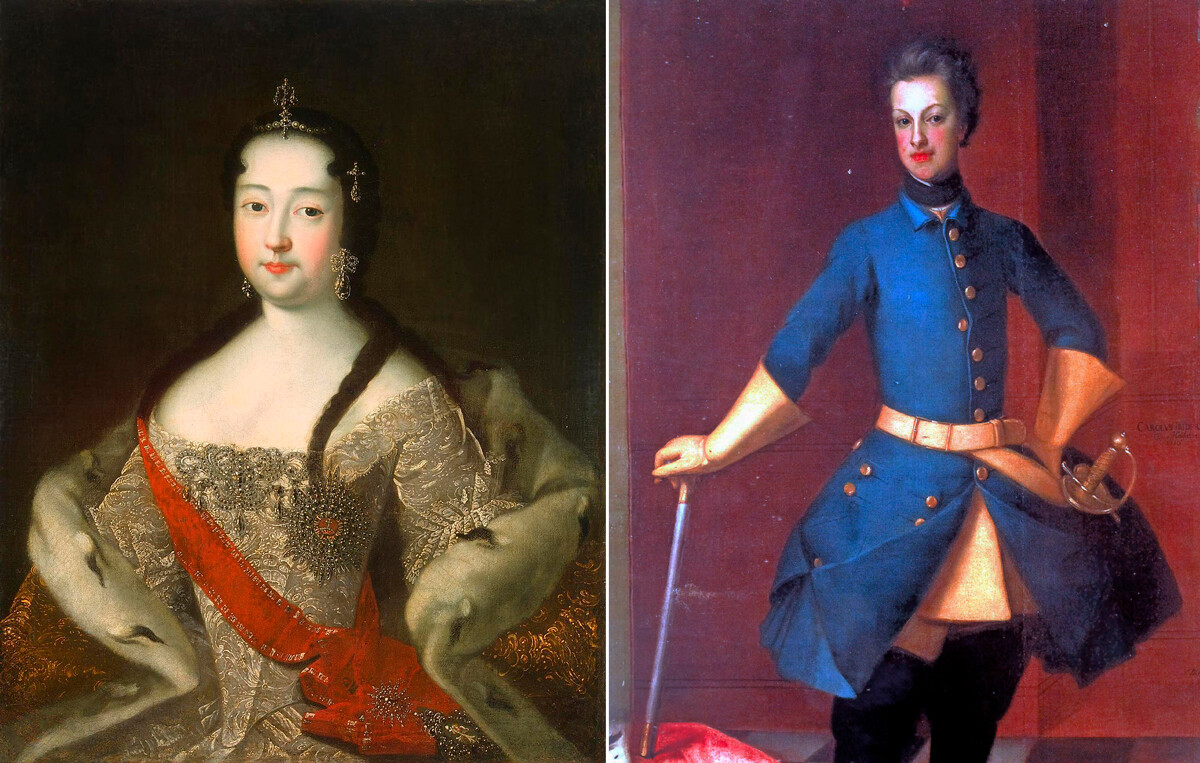
Anna Petrovna and Charles Frederick, Duke of Holstein-Gottorp – parents of Peter III
Public DomainOf course, neither a nervous temperament nor an addiction to strange games or alcohol are sufficient to declare someone insane. It should be kept in mind that Peter’s image in the eyes of posterity was influenced by the hostile attitude of Catherine, who remained insulted for life as an unloved spouse – and, at the same time, left the most memoirs about his life. But, even then, the positive traits were ignored.
“He knew theology and Latin well,” Yakov Shtelin wrote of Peter Fyodorovich. “In St. Petersburg, he willingly spoke Latin with the most noble Russian clergymen.” In addition, from a young age, Peter was fond of music – he liked to play the violin. It is generally believed that the heir’s playing was ugly – but, apparently, this was not so. At his “little court” at Oranienbaum near St. Petersburg, Peter had his own theater, to which he invited young Italian composer Vincenzo Manfredini. In addition, the Grand Prince opened a violin school in Oranienbaum for children, without distinction of origin or wealth, in which he himself taught. He also assembled a collection of expensive violins.
On becoming the Emperor, Peter Fyodorovich surprised all his detractors by zealously taking up state affairs. “Already in the morning, he was in his study, where he listened to reports, then hurried to the Senate or the Collegiums. In the Senate, the most important cases he himself took on vigorously and assertively,” wrote Shtelin. His main reform was the abolition of the mandatory service of the nobility, the ‘Manifesto on the Freedom of the Nobility’ in 1762. Additionally, he closed the notorious Secret Chancellery (an organ of political investigations established by Peter the Great), launched the issue of paper banknotes and supported commerce by opening the State Bank. During the first 186 days of his reign, 192 official documents were signed. However, a separate peace with Prussia, ruled by Peter’s idol, Frederick II the Great, crossed out all the achievements of the new emperor and became an excuse to overthrow Peter from the throne.
The mutual dislike of Peter and Russia was explained by the fact that the heir wished to occupy the Swedish throne, rather than the Russian one. But, this possibility was forever closed to him after his baptism into Orthodoxy in 1743 at the insistence of Elizabeth Petrovna. In 1751, when Peter’s uncle and guardian, Adolf Friedrich, became King of Sweden, Peter said: “They have dragged me into this damned Russia, where I must consider myself a state prisoner, whereas, if they had left me free, I would now be sitting on the throne of a civilized nation.”
Not surprising in this context is the defiant behavior of Peter Fyodorovich at Elizaveta Petrovna’s funeral. Walking behind the funeral chariot, he would suddenly stop and then run to catch up with the chariot, so that his mourning plume would be blown by the wind. He found that amusing.
If using any of Russia Beyond's content, partly or in full, always provide an active hyperlink to the original material.
Subscribe
to our newsletter!
Get the week's best stories straight to your inbox